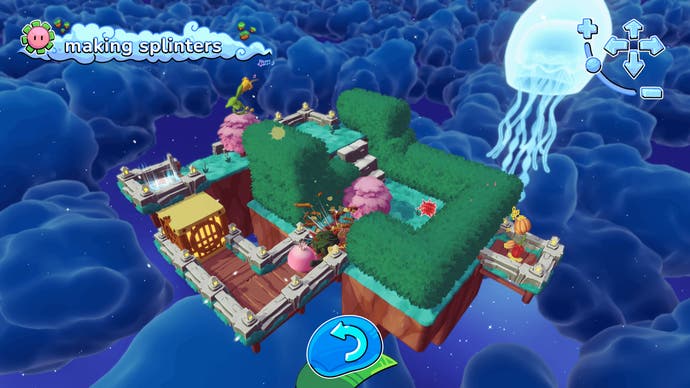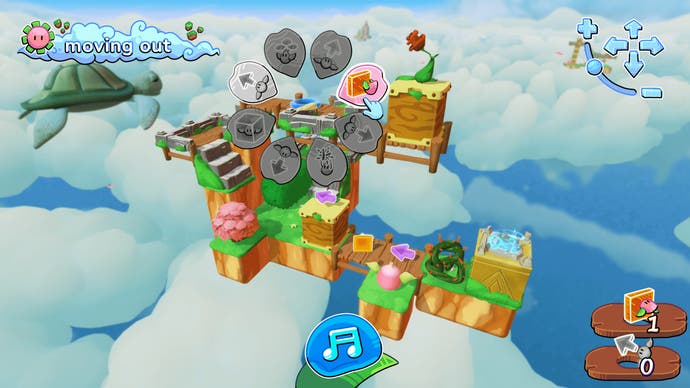Three years ago, everything was about to change for small Australian studio Witch Beam. It was getting ready to launch its second game – a game about unpacking boxes and finding a space for your stuff. Unpacking, it was called. And the hope was that it would build on the success of the studio’s first game, Assault Android Cactus, an energetic twin-stick shooter that did relatively well. But he was afraid, because how many people would want a smooth object placement game? How many people would understand what he was trying to do?
Witch Beam needn’t have worried. In just one year, Unpacking reached a million sales – far, far beyond anything Assault Android Cactus had done. She raised the studio to fame. Eurogamer awarded Unpacking Game of the Year in 2021 and Unpacking won awards including two gaming BAFTAs. For Witch Beam, it was an unmitigated success. “It’s been life-changing,” co-founder Sanatana Mishra tells me now. “We spent a decade pursuing our creative passion while weighing every little decision against the possibility of becoming poor at the end of that road you go down, and it was a tough time. We traded in our youth and our health in a way that is only really possible once or twice in your life it was life changing for everyone on the team and everyone we work with has been fantastic.
And now the team is back with a new game called Tempopo.
Tempopo is as different from Unpacking as Unpacking was from Assault Android Cactus. It’s a puzzle game again, yes, but this time it’s about guiding jumping creatures through dense obstacle courses in the garden while music dances around you. “Planning and execution is the cycle that the game has,” explains Mishra, who created the concept with his friend Seiji Tanaka, who was once an animator on the legendary game Journey. They came up with the idea in a game jam while thinking about “unresolved evolutionary networks,” of all things. Think saber-toothed tigers. “Why does she die, but not another animal?” Mishra asks.
It’s a similar thing to game genres or certain game ideas, in Mishra’s mind. “When I look at these classic games that I love – Lemmings and ChuChu Rocket! – I say, ‘Why aren’t these things interesting to people anymore?’. What decisions did they make that meant – in the way people expect games to exist now – that game doesn’t work?” And perhaps more importantly, as a follow-up to this thought: “Is there any other way it could have mutated and been incredibly successful?” This is where the essence of Tempopo’s idea comes from. But it wasn’t until Witch Beam co-founder and songwriter Jeff van Dyck got involved that it really took the musical form we see now.
Manage cookie settings
The essence of Tempopo should be easy to understand. You are on a mission to find lovely magical flowers and turn them into a garden, where you will create a kind of soundscape. “Planning and execution is the cycle the game has,” says Mishra. Before the level starts, you issue instructions to the healthy creatures, and when you’re happy, you start the level to see if they’ll complete it successfully. No real-time data. If you want to change something because your plan didn’t work, you start over. But there is no stress.
“I want to try to avoid a problem I have with a lot of games, especially in the puzzle space, where I feel a huge amount of anxiety playing them,” Mishra says. “I feel judged because I constantly feel like I’m not good enough for the game in some way.” He says he hears people say all the time that they ‘can’t do puzzle games’ and it annoys him. “We’re all pretty good at puzzle games in our own right,” he tells me. “It’s literally part of our evolutionary biology. But we constantly feel this kind of anxiety that the game says, ‘Oh, maybe you should have solved that a little bit faster; you should have done that a little bit faster; you should have known that — you should know how it works.’ So I’m trying to put people in this relaxed space,” he says. “I want people to sit down with Tempopo and feel a sense of calm wash over them.”



This sense of calm ties in with the game’s main theme of harmony. It’s there in the musical harmonies you’ll create in your garden’s soundscape, obviously, but also in the game actions you take as your jumping blobs try to help each other overcome puzzles, and in the main character Hannah’s journey through game. Perhaps harmony will also be a theme that resonates with you as you play. “As you gain more understanding of the game and its elements, and you start to think a little more about the characters and what they’re trying to do, and you understand the plot going forward, you can take that theme and run with it in your mind how useful it is,” says Mishra. “I think it’s very useful, anyway, to think about harmony in this world,” he adds. “It’s not exactly like I’m going to knock people over with it. It’s just a fundamental element of that is what the game is about.”
These deeper themes are reminiscent of what Unpacking did so well, which was to be – on the surface – a puzzle game about unpacking boxes and finding space for objects, but underneath, to also be a game that told the story of one’s life. A story that was gently very moving, which is why it resonated so much with so many of us. But while Tempopo has deeper themes, “It’s a whole different experience,” Mishra points out. It’s worth noting here that Unpacking’s lead creator Wren Brier is not working on the project. “Wren is taking a break from development,” says Mishra. “Her and Tim [Dawson, the third Witch Beam co-founder] are partners so they’re living together, still doing stuff and all that, but Wren desperately needs a break. She was working so hard on Unpacking, and then it came out and we did different versions on other platforms, and different talks and events and things. Now it will be recharged before dealing with something new.”
Second, Witch Beam never intended Tempopo to be the same type of game. They had discussions about making Unpacking 2 because people kept – and still – asking the studio for it, but the discussions never got very far. “We had a 10-second conversation about it. We were like ‘we don’t want to do this,'” he says. “We thought it was a complete game that stands on its own.” In other words, the idea was done and the studio didn’t want to retread old ground and become known for just one thing. “If anything,” he says, “I’d say our creative brand is that there’s no single theme that’s always going to run through everything—it’s entirely dependent on what we find exciting and interesting at the moment.” Usually, if someone is passionate enough to see an idea through, “that’s enough for everyone else to understand.”
Manage cookie settings
Mishra actually compares Witch Beam’s way of working to an artist’s collective, in that the core of the studio—the three founders—remains the same, but the collaborators on individual projects vary. Unpacking’s Wren Brier was technically a collaborator, as was Tempopo’s co-creator Seiji Tanaka. “And we try, based on how the project goes, to make sure that the success goes back to the people who work with us,” says Mishra. The success of Unpacking benefited not only Witch Beam, for example, but also the wider development scene in Queensland, Australia. “That’s why I said earlier that we’re going to stay small despite our success, because we want to be the ones making the games and then try to use that success to empower our local developers here to make their games .”
Witch Beam hasn’t bet the bank on Tempopo repeating Unpacking’s runaway success, so that’s a relief. Theoretically I imagine it could run for years off just the revenue of that game. But we cannot escape the feeling of pressure that comes with great success. “There’s absolutely no doubt that you’ve done one successful thing, so now everything else you ever do will be measured against what you did before,” says Mishra. “And that’s a little bit terrible from a creative point of view.” Because what if you don’t live up to it – does that mean you fail in some way? It’s scary. “But whenever I focus too much on that pressure,” he adds, “I think about the fact that it’s only coming because we’re in a position that everybody would like to be in.” He reminds himself: “It is very privileged to be in this country.”
Tempopo is in development for PC, Switch and Xbox, and has a loose target of releasing this year.